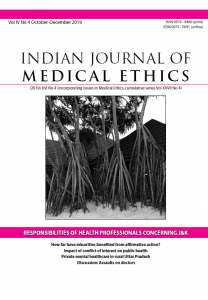Stretching the limits?

This issue has an energetic discussion on whether bioethics guidelines in a
conflict zone are “an esoteric philosophical exercise for academics sitting in
comfortable conference rooms” or can be muscular enough “to protect the
vulnerable”. In the same vein, should bioethics shun issues like the deprivation
of healthcare in Kashmir after the clampdown, and claim that “it has no
information” on the subject? Will this not make it irrelevant in an increasingly
violent and polarised world? Our editorial explores the health professionals’
obligations regarding such deprivation. The research studies in this issue
examine how far affirmative action policies have succeeded in including
ethnic and religious minorities in health, education and governance in India;
why parents agree to their children participating in research on genetic
disorders; and how mental healthcare available to rural Indians is neither
adequate nor ethical.
Two articles look into the damaging effects of conflict of interest which can wreck the most fabled institutions, and ultimately, public health. Similarly, international efforts to achieve pole position in genetic research fields like CRISPR may turn infants into guinea pigs. Even vaccination, intended for the public good, is fraught with ethical dilemmas, as a comment explains. When things go wrong, irate patients may attack soft targets, interns and nurses, in public hospitals. What can be done to change this is the subject of our second discussion. Book and film reviews round off this varied issue, which contains the Report of the 14th World Congress of Bioethics in India, last December, and that of the Parallel Arts Festival.
Cover credit: ‘Resisting Erosion’, courtesy of Dr Olinda Timms
Two articles look into the damaging effects of conflict of interest which can wreck the most fabled institutions, and ultimately, public health. Similarly, international efforts to achieve pole position in genetic research fields like CRISPR may turn infants into guinea pigs. Even vaccination, intended for the public good, is fraught with ethical dilemmas, as a comment explains. When things go wrong, irate patients may attack soft targets, interns and nurses, in public hospitals. What can be done to change this is the subject of our second discussion. Book and film reviews round off this varied issue, which contains the Report of the 14th World Congress of Bioethics in India, last December, and that of the Parallel Arts Festival.
Cover credit: ‘Resisting Erosion’, courtesy of Dr Olinda Timms
